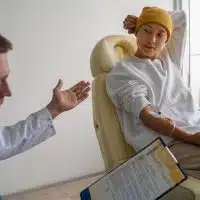
When it comes to health, early intervention often leads to better outcomes—and this is especially true for issues involving your bones, joints, and muscles. Whether you’re dealing with chronic back pain, a sports injury, or stiffness in your knees, seeing an orthopedic specialist early can make a significant difference in your recovery, long-term mobility, and quality of life.
In this article, we’ll explore the key reasons why timely consultation with an orthopedic doctor maters , what signs to watch for, and how early treatment can prevent more serious complications.
What Is an Orthopedic Specialist?
An orthopedic specialist is a medical professional trained to diagnose, treat, and manage conditions of the musculoskeletal system. This includes bones, joints, ligaments, tendons, and muscles. These specialists help treat everything from fractures and arthritis to spinal problems, sports injuries, and congenital disorders.
Some orthopedic doctors focus on specific areas of the body—such as the spine, hips, or hands—while others may specialize in sports medicine or joint replacement surgery.
Why Early Diagnosis Matters
Delaying a visit to an orthopedic specialist can lead to complications that are more difficult and costly to treat. Early diagnosis allows for:
- Better treatment outcomes: When caught early, many orthopedic conditions can be treated with non-invasive methods such as physical therapy, medications, or lifestyle changes.
- Pain relief: Chronic pain often worsens over time. Consulting a specialist early can help relieve discomfort and restore function sooner.
- Injury prevention: Addressing biomechanical issues or weaknesses early can prevent further injuries, especially in active individuals or athletes.
- Avoiding surgery: Many musculoskeletal problems, if treated promptly, do not require surgery. Early intervention increases your chances of managing your condition conservatively.
Common Reasons to See an Orthopedic Specialist
You don’t need to be an athlete or have a major injury to benefit from orthopedic care. If you’re experiencing any of the following symptoms, it’s time to see a specialist:
- Persistent joint pain lasting more than a few weeks
- Swelling or stiffness in the knees, shoulders, or hips
- Limited range of motion that affects daily activities
- Back or neck pain that doesn’t improve with rest
- Frequent ankle sprains or foot problems
- Tingling, numbness, or weakness in arms or legs
- Difficulty walking or bearing weight on a joint
These symptoms may be signs of conditions such as osteoarthritis, tendonitis, bursitis, herniated discs, or early-stage degenerative diseases—all of which benefit from early treatment.
How Orthopedic Specialists Help
An orthopedic specialist will conduct a thorough evaluation, which may include physical exams, imaging (X-rays, MRIs), and mobility tests. From there, they can create a personalized treatment plan based on your diagnosis and lifestyle needs.
Treatment options may include:
- Physical therapy to restore strength and mobility
- Medications to reduce pain and inflammation
- Injections, such as corticosteroids or hyaluronic acid
- Bracing or orthotics to support movement and healing
- Minimally invasive procedures or, in some cases, surgery
In many situations, early action allows patients to avoid surgery altogether and return to normal activity faster.
The Risks of Waiting Too Long
Ignoring early signs of orthopedic problems can lead to serious consequences:
- Permanent joint damage: Conditions like arthritis or rotator cuff tears worsen over time, potentially causing irreversible damage.
- Loss of function: Delaying treatment may lead to reduced mobility or the inability to perform daily tasks.
- Chronic pain: What starts as a minor ache can evolve into debilitating pain, affecting work, exercise, and sleep.
- More invasive treatments: When conservative treatments are no longer effective, more aggressive interventions such as surgery may become the only option.
The sooner you see an orthopedic specialist, the better your chances of avoiding these outcomes.
Who Should Consider Early Orthopedic Care?
While orthopedic care is important for all age groups, certain populations should be especially proactive:
- Athletes and active individuals: Repetitive motion or sports injuries should be assessed promptly to prevent long-term complications.
- Older adults: Age-related conditions such as arthritis or osteoporosis can be managed more effectively when diagnosed early.
- Children and adolescents: Early detection of developmental issues, scoliosis, or growth plate injuries can influence lifelong health.
- Manual laborers or desk workers: Jobs that strain the body, whether through heavy lifting or prolonged sitting, can lead to orthopedic issues if not addressed.
Orthopedic Care in Indonesia
In Indonesia, access to orthopedic care is improving, especially in urban centers like Jakarta, Surabaya, and Bali. Orthopedic specialists in Indonesia are well-versed in both surgical and non-surgical treatments, and many hospitals now offer advanced diagnostic tools and rehabilitation programs.
If you’re unsure whether your symptoms warrant a visit, consider consulting a general practitioner first. They can refer you to an orthopedic doctor when necessary.
Don’t Wait to Seek Help
Your mobility is your independence. Whether you’re recovering from an injury or managing a chronic condition, seeing an orthopedic specialistearly is one of the smartest steps you can take for your long-term health. By acting promptly, you can avoid unnecessary pain, reduce the risk of complications, and return to doing the activities you love.
Don’t ignore that persistent pain or stiffness—your body is trying to tell you something. When it comes to musculoskeletal health, early action is the key to lasting relief and better outcomes. Please contact BIMC Hospital Kuta for more information and appointment at +62 811 3960 8500 (text only). BIMC Emergency Call 24 Hours +62 361 761263, +62 812 386 5548.











